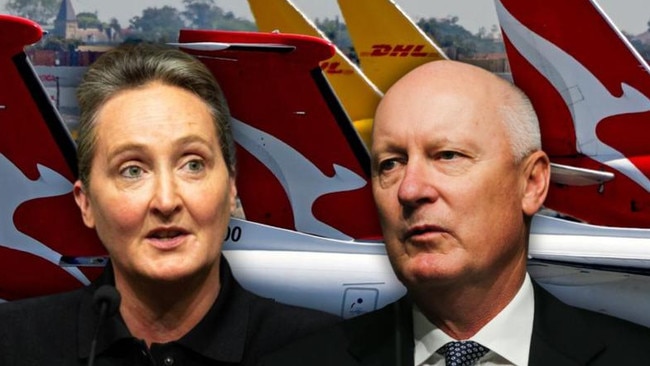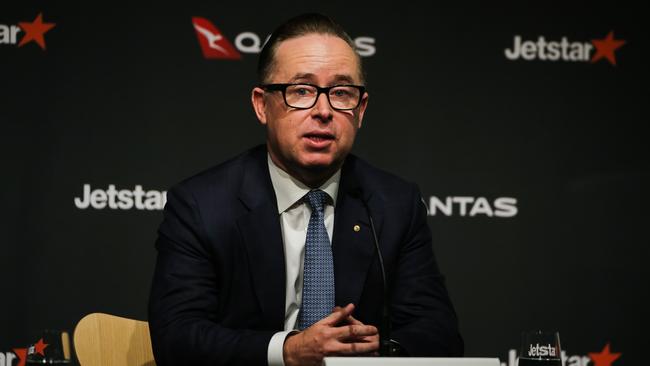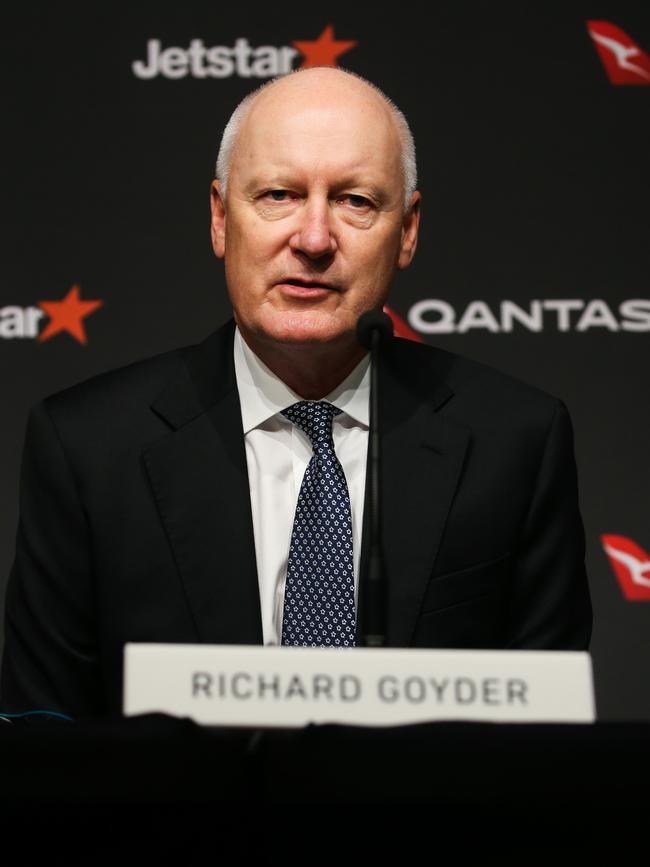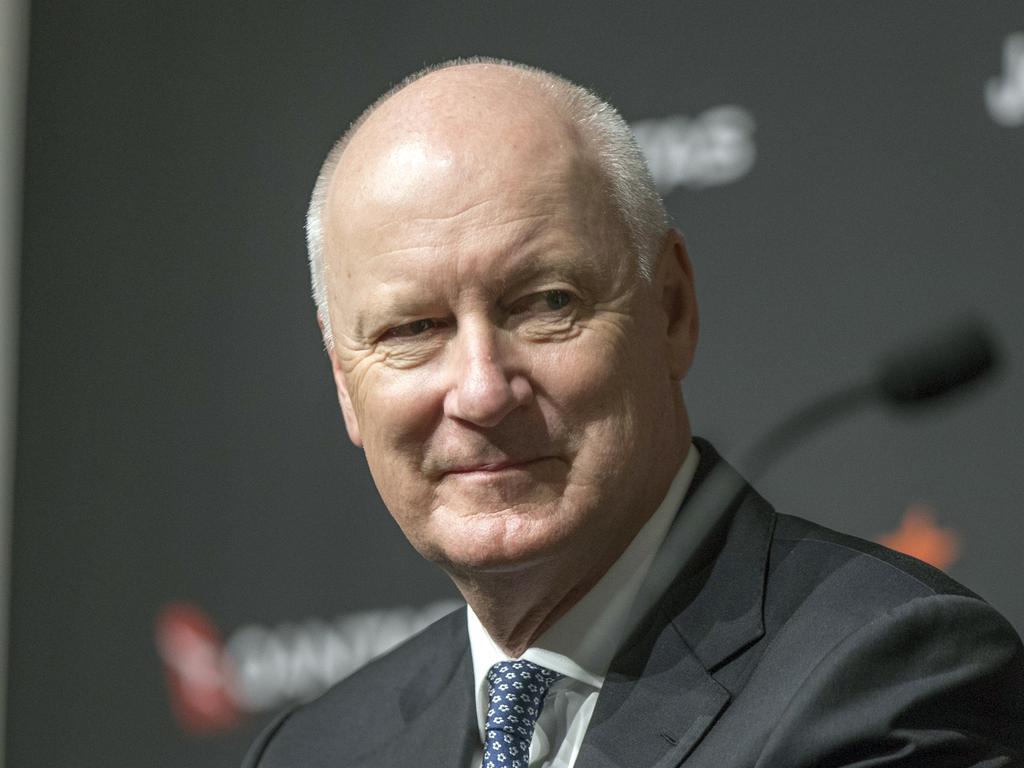
These meetings will also test the support for him to stay on as chairman.
The message is that he intends to continue, in order to see through the transition to new chief executive Vanessa Hudson and push ahead with board renewal. The view from inside the Qantas boardroom is that Goyder is firmly committed to Qantas, but shareholders have the final say in this and they are demanding answers around the never ending reputational hits.
It remains up in the air if the trimming and deferral of short-term executive bonuses and the clawback of up to $14.4m in specific bonus payments and pay from former chief executive Alan Joyce will be enough to placate investors.

Amid the reputational hits and a damaging ACCC legal action, Qantas’ shares are down nearly 15 per cent since its bumper $2.4bn profit was handed down last month.
A shareholder “strike” – a vote against the board – is in the balance ahead of the upcoming annual meeting scheduled for November 3.
The first step was holding back the final payout for Joyce, including up to $10.5m this year with millions more in potential long-term bonus payments also in the balance. Joyce still emerges with nearly $11m in pay and benefits, although that is largely as a result of shares vesting instead of cash during the emergency period of the Covid years. These deferred payments were approved by shareholders during Covid.
The airline has since staged a rapid financial recovery – many airlines around the world are still in post-Covid stress – it is believed Goyder felt the ACCC action and the brand damage that has followed should send a message to the new executive team being assembled by Hudson. All of Qantas’ top executives saw short-term cash bonus payments cut by 20 per cent and the leftover component frozen in recognition of the ACCC case. This also impacted non-airline roles such as Qantas loyalty boss and CEO contender Olivia Wirth.
Going forward reputation will rank alongside total stock return as a measure for how long-term bonuses are paid.
All up this year’s pay hits have already cost Qantas’ new executive team millions of dollars, but it could be argued that former Commonwealth Bank chairman Catherine Livingston went harder on the bank’s then executive team when it was hit with damaging Austrac legal action in 2017.
At the time she sliced all short-term bonus payments to zero as well as long-term incentives to the point that former boss Ian Narev and other executives ended up walking away with next to nothing during their last year at the bank.
Three issues
In the weeks ahead there are three issues Goyder needs to explain to shareholders to support his case to remain.
The first is Alan Joyce’s decision to sell $17m worth of shares in the airline in June while a $500m buyback was ongoing. Goyder had sanctioned the sale and has previously said he believed there was a window open for Joyce to sell before the airline moved back into a blackout period preventing share sales.
The second is the board’s ongoing support for Joyce to appeal the sacking of 1700 baggage handlers and ground staff all the way to the High Court. That miscalculation has since come back to bite Qantas and it is now forced to negotiate a costly compensation payout with unions from a position of weakness.

Finally, the most damaging issue that goes to the heart of trust is the ACCC allegations the airline had knowingly sold seats on ghost flights that were never going to take off.
While the allegations have not been tested in court, this could be a serious issue for Hudson if they show that serious misconduct took place and airline executives were aware of the behaviour.
In the annual report Goyder attempted to address the legal problems. “On any matter, management and the Board only take a course of action if they believe it’s lawful. However, we also accept that there must be accountability where those actions are found to be otherwise.”
Goyder has two big publicly listed companies on his plate, oil and gas giant Woodside which at $70bn towers over Qantas (just under $10bn). He also is higher profile than most in his position given his role heading up the emotionally charged AFL. This is adding to the attention being directed at him. There was a Woodside board meeting this week although Qantas has taken substantial focus, those close to him say he is putting focus into each of the roles and intends to continue. However, that may not be Goyder’s decision with shareholders set to have their say.
Closed doors
Meanwhile, Qantas boss Vanessa Hudson has been given a boost by avoiding the spectacle of having to front up to the Federal Court to hammer out compensation payments for 1700 illegally sacked airline workers from the witness box.
In the first instance, the mediation will take place behind (relatively) closed doors one-on-one, where the mechanics of industrial relations and compensation are better suited to take place.
And in a big twist, Federal Court Justice Michael Lee has ordered the chief executive into the talks. As a matter of course, CEOs of large companies rarely get directly involved in union negotiations, with the process delegated to chief legal counsel or head of human resources.
While Justice Lee’s order of who should attend talks looks like overreach, the Federal Court has clearly lost patience with Qantas and in doing so is turning up maximum pressure on the airline to sort the matter out. Adding to the gravity, the mediation will be overseen by the Federal Court’s former chief justice James Allsop.
“It is appropriate in escalating it to an appropriate level to maximise prospects of settlement,” Justice Lee told the court earlier on Wednesday.
And in this case, the court is giving Hudson a backhanded favour giving her the space to mediate outside the public glare.
Having new CEO Hudson’s time chewed up in industrial talks against Transport Workers Union boss Michael Kaine also guarantees Qantas will seek expediency over a drawn out settlement and the airline will quickly land a compensation payout.
Make no mistake – it will cost Qantas dearly and will potentially rank as one of the nation’s biggest industrial compensation payouts – the airline will then be able to draw a line under it and move on to the next issue.
It follows a massive miscalculation by Joyce in seeking to fight all the way to the High Court the decision to sack the baggage handlers and ground staff while they were stood down. The High Court last week rejected the appeal, and the case has now been bumped back to the Federal Court.
The transition to internal CEO candidate Hudson represents an incredibly vulnerable time for Qantas, with unions emboldened by the High Court win. Qantas needs to hold a firm line with unions to keep a lid on costs, but has to admit it broke the rules in dealing with the sacked workers.
The airline however is coming from a position of weakness as it attempts to win back the support from customers and any political support it had has quickly evaporated given its own bad behaviour.
Hudson’s main priority is to rebuild trust with customers after the Australian Competition & Consumer Commission has sued the airline for allegedly selling seats on flights it had already cancelled. Those claims triggered the early retirement of Joyce.
On the financial side, airfares are slowly starting to normalise from post-Covid-19 highs and the airline itself has a massive $10bn-plus fleet renewal program. Outbound tourism will be impacted by a lower Australian dollar while capacity is being added into the region. This all suggests that earnings growth is going to be harder to come by for Hudson.
On Wednesday Treasurer Jim Chalmers speaking at a Walkley Foundation lunch in Sydney said length of CEO tenure is a matter for the boards of private companies. Former Qantas boss Alan Joyce notched up 15 years. However the focus for Qantas and its new CEO Hudson are the issues in front of it.
“I think the new CEO Vanessa Hudson has rightly identified that Qantas has a lot of work to do now, to regain the trust of their customers and the country more broadly, that needs to be their primary focus. That’s something that Vanessa has acknowledged herself,” Chalmers said.






The coming weeks will be critical for Qantas chairman Richard Goyder as he does the rounds meeting with big shareholders to gauge longer-term backing for the tarnished airline under its new chief executive.